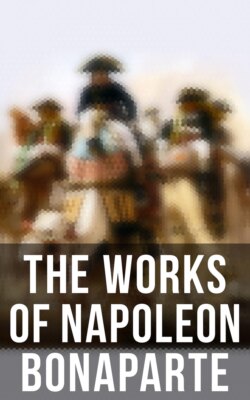Читать книгу The Works of Napoleon Bonaparte - Louis Antoine Fauvelet de Bourrienne - Страница 50
На сайте Литреса книга снята с продажи.
ОглавлениеMAXIM XLV.
Table of Contents
A fortified place can only protect the garrison and detain the enemy for a certain time. When this time has elapsed, and the defences of the place are destroyed, the garrison should lay down its arms. All civilized nations are agreed on this point, and there never has been an argument except with reference to the greater or less degree of defence which a governor is bound to make before he capitulates. At the same time, there are generals—Villars among the number—who are of opinion that a governor should never surrender, but that in the last extremity he should blow up the fortifications, and take advantage of the night to cut his way through the besieging army. Where he is unable to blow up the fortifications, he may always retire, they say, with his garrison, and save the men.
Officers who have adopted this line of conduct, have often brought off three-fourths of their garrison.
NOTE.
In 1705, the French, who were besieged in Haguenau by Count Thungen, found themselves incapable of sustaining an assault. Péri, the governor, who had already distinguished himself by a vigorous defence, despairing of being allowed to capitulate on any terms short of becoming prisoner of war, resolved to abandon the place and cut his way through the besiegers.
In order to conceal his intention more effectually, and while he deceived the enemy, to sound at the same time the disposition of his officers, he assembled a council of war and declared his resolution to die in the breach. Then, under pretext of the extremity to which he was reduced, he commanded the whole garrison under arms; and leaving only a few sharpshooters in the breach, gave the order to march, and set out in silence, under cover of the night, from Haguenau. This audacious enterprise was crowned with success, and Péri reached Saverne without having suffered the smallest loss.
Two fine instances of defence in later times are those of Massena at Genoa, and of Palafox at Saragossa.
The first marched out with arms and baggage, and all the honors of war, after rejecting every summons, and defending himself until hunger alone compelled him to capitulate. The second only yielded after having buried his garrison amid the ruins of the city, which he defended from house to house, until famine and death left him no alternative but to surrender. This siege, which was equally honorable to the French as to the Spaniards, is one of the most memorable in the history of war. In the course of it, Palafox displayed every possible resource which courage and obstinacy can supply in the defence of a fortress.
All real strength is founded in the mind; and on this account I am of opinion that we should be directed in the choice of a governor, less by his genius than his personal character. His most essential qualities should be courage, perseverance, and soldierlike devotedness. Above all, he should possess the talent not only of infusing courage into the garrison, but of kindling a spirit of resistance in the whole population. Where the latter is wanting, however art may multiply the defences of a place, the garrison will be compelled to capitulate after having sustained the first, or at most, the second assault.
